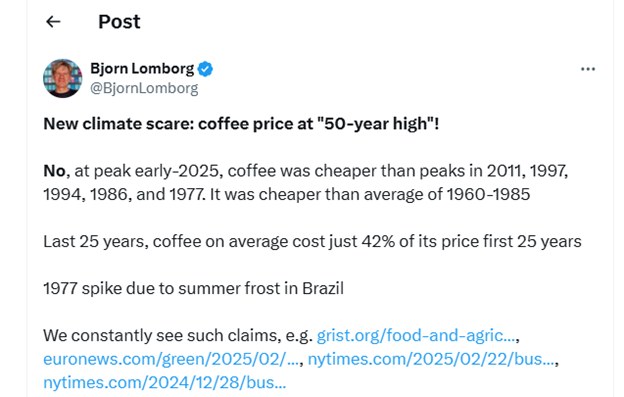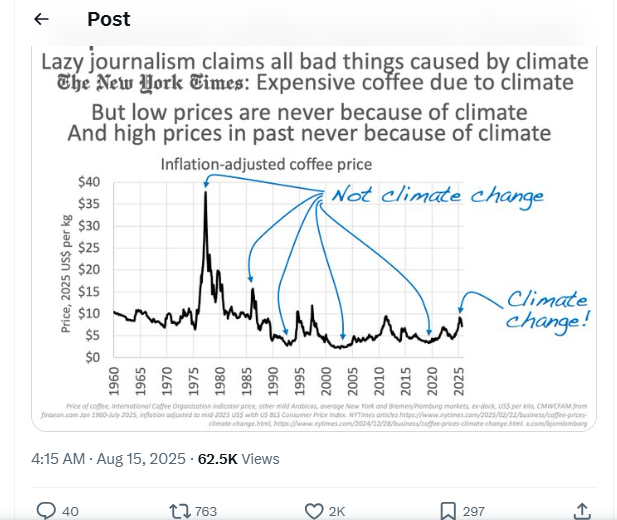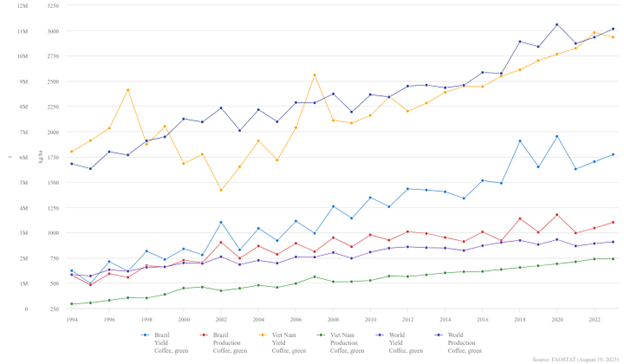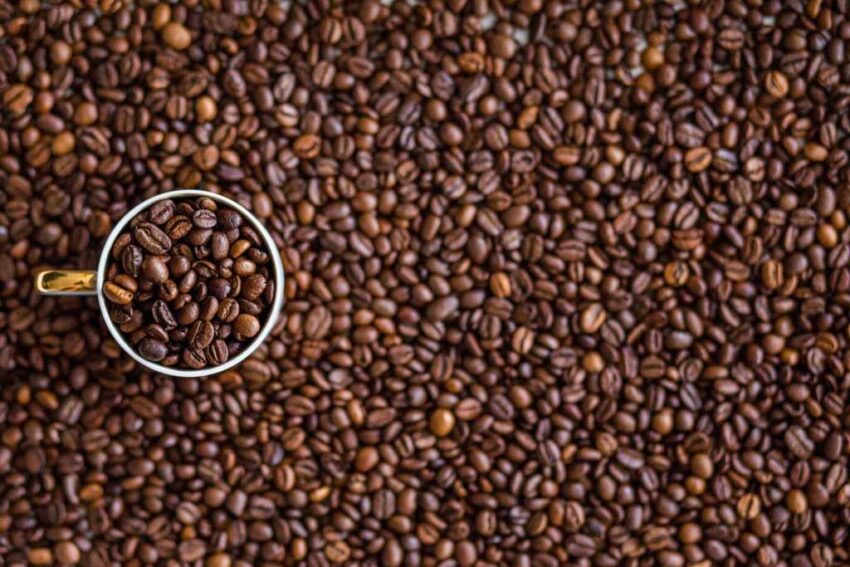Grist posted a story blaming climate change for a recent rise in coffee prices. This is false, coffee production and yields have improved amid modest warming. As a result, Grist must seek another cause for higher prices.
In the story, “Climate change has sent coffee prices soaring. Trump’s tariffs will send them higher,” Grist staff writer, Frida Garza, spends 85 percent of her story describing how the tariffs President Donald Trump is imposing on Vietnam will likely affect a recently developed artisanal coffee company, using organically grown Vietnamese Robusta blends, and then generalizing the claims to the impacts on coffee from other growing regions like Brazil. Note, despite climate change leading in the title, so far the story only discusses the potential impacts of tariffs on future coffee prices.
Only the last section of the story deals with climate change, and then only to imply that climate change has caused recent droughts that have affected some coffee growers.
“Hartley added that one of the impacts of droughts on coffee growers is that younger farmers worried about the future are considering leaving the business,” writes Garza. “Regardless of whether the U.S. imposes prohibitive tariffs on individual coffee-growing countries, climate change is already taking a toll on this workforce.”
Except in the misleading title of the story, nowhere does Garza specifically argue that climate change has caused droughts, with attendant coffee shortages, resulting in higher prices. Which is good, as far as it goes, since there is no evidence climate change is causing worsening droughts or causing a decline in coffee production or harvests. As such, one can only surmise Garza used “climate change” as a hook to snag readers attention.
Concerning drought, Climate Realism has posted more than 100 stories rebutting false media claims that climate change has made the occurrences of drought more frequent or severe, here, here, and for Brazil, here, for instance.
Garza can’t draw support for her suggestion that climate change is causing worsening drought conditions from the U.N. Intergovernmental Panel on Climate Change, either. In its most recent report, the 2021 Sixth Assessment report, the IPCC distinguishes four categories of drought: hydrological, meteorological, ecological, and agricultural. The IPCC finds no evidence climate change has increased the number, duration, or intensity of hydrological or meteorological droughts, and it has only medium confidence it has “contributed to changes in agricultural and ecological droughts and has led to an increase in the overall affected land area.”
Even for ecological and agricultural droughts the data is a mixed bag. The IPCC divides the world into 47 separate regions of study when analyzing drought trends, and its data suggest ecological and agricultural drought may have increased during the period of modest warming in 12 of those 47 regions. However, in only two of those regions does the IPCC have even “medium confidence” for any human role in the observed increase. For the remaining regions experiencing a possible increase in droughts, the IPCC has low confidence human activities have had any discernible impact.
Climate change can’t be blamed for causing a phenomenon, increasing drought frequency and severity, that is not happening.
Nor is there evidence in either coffee production data or price data that climate change is causing a crisis.
In response to the Grist article and one from earlier in the year published by the New York Times, climate researcher Bjorn Lomborg posted a short but thorough refutation on X, showing that prices in recent years and decades are neither records, nor even higher then average when compared to the past. (see below)

Lomborg then provided this helpful chart:

Dozens of articles posted at Climate Realism examine and debunk previous false claims made in myriad mainstream media stories that climate change has caused a decline in coffee yields and production, resulting in rising prices. Data from the U.N. Food and Agriculture Organization show relatively steady gains in coffee yields and production in Vietnam, Brazil, and for the world as a whole between 1994 and 2023, with new records for both being set with some regularity. (see the graph below).

Since coffee production and yields have increased dramatically overtime, it is simply false to link higher coffee prices to climate change induced impacts on production. During the recent period of slight global warming, coffee, like almost every other crop, has seen gains due to the fertilization effect of higher CO2 and improved growing conditions. Since climate change isn’t disrupting coffee production, it can’t be blamed for any rise in prices.
In the end, despite the title, Garza’s article is mostly speculation about potential future impacts of the Trump administration’s tariffs on future coffee prices, with a little climate alarm unjustifiably thrown in for no identifiable reason. The story as a whole is pure carnival sideshow prognostication. Will tariffs cause higher coffee prices? Maybe, maybe not. But whatever has contributed to recent increases in coffee prices, prices that are still below historic averages and highs, and there is no evidence whatsoever that climate change has anything to do with it. That is the truth. Based on the evidence of this story, Grist is evidently not in the business of telling the truth.
The post Wrong Again, Grist, Climate Change Is Not Causing Higher Coffee Prices appeared first on ClimateRealism.
Click this link for the original source of this article.
Author: H. Sterling Burnett
This content is courtesy of, and owned and copyrighted by, https://climaterealism.com and its author. This content is made available by use of the public RSS feed offered by the host site and is used for educational purposes only. If you are the author or represent the host site and would like this content removed now and in the future, please contact USSANews.com using the email address in the Contact page found in the website menu.





